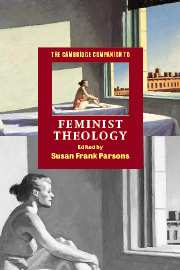Book contents
- Frontmatter
- Part one The shape of feminist theology
- 1 The emergence of Christian feminist theology
- 2 Feminist theology as intercultural discourse
- 3 Feminist theology as philosophy of religion
- 4 Feminist theology as theology of religions
- 5 Feminist theology as post-traditional thealogy
- 6 Feminist theology as biblical hermeneutics
- 7 Feminist theology as dogmatic theology
- Part two The themes of feminist theology
- Index
5 - Feminist theology as post-traditional thealogy
from Part one - The shape of feminist theology
Published online by Cambridge University Press: 28 May 2006
- Frontmatter
- Part one The shape of feminist theology
- 1 The emergence of Christian feminist theology
- 2 Feminist theology as intercultural discourse
- 3 Feminist theology as philosophy of religion
- 4 Feminist theology as theology of religions
- 5 Feminist theology as post-traditional thealogy
- 6 Feminist theology as biblical hermeneutics
- 7 Feminist theology as dogmatic theology
- Part two The themes of feminist theology
- Index
Summary
THE EMERGENCE OF POST-TRADITIONAL THEALOGY
The word thealogy comes from the Greek words thea or Goddess and logos or meaning. It describes the activity of reflection on the meaning of Goddess, in contrast to theology, from theos and logos, which is reflection on the meaning of God. The adjective 'post' in the title of this chapter is somewhat problematic. If taken to imply that feminist thealogies designated as 'post-traditional' have developed in reaction to the limitations of Christian and Jewish theologies, it would be correct. However, if thought to mean that such thealogies do not look to the past, it would be wrong. Indeed, many 'post-traditional' feminist thealogies might be called 'pre-traditional' in that they claim to be rooted in a past far more ancient than the sacred histories of Christianity and Judaism. Whereas the times of Abraham and Moses were less than 4,000 years ago, post-traditional Goddess feminists locate their origins in the mists of time, in the Upper Palaeolithic, about 30,000 years ago. On the other hand, because Christianity outlawed the explicit practice of all pre-Christian religions (with the edicts of Theodosius, called 'the Great', at the end of the fourth century ce), 'post'-traditional thealogies cannot claim a direct inheritance of pre-Jewish or pre-Christian religious symbols, rituals, or ideas. I have used the word 'post-traditional' rather than 'post-Christian' in this chapter, because the practitioners of 'post-traditional' religion include both Christians and Jews. A number of the most influential proponents of feminist 'post-traditional thealogy', including Starhawk (Miriam Simos), Naomi Goldenberg, Margot Alder, Miriam Robbins Dexter, Gloria Orenstein, Asphodel Long, and Melissa Raphael are from Jewish backgrounds.
- Type
- Chapter
- Information
- The Cambridge Companion to Feminist Theology , pp. 79 - 96Publisher: Cambridge University PressPrint publication year: 2002
- 3
- Cited by



